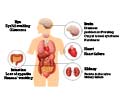Treatment of inflammation in multiple sites in the same patient can be complicated because a medication effective for one disorder may exacerbate the other.

More than 60 years ago, adrenocorticotropic hormone (ACTH) was shown to be effective for treating rheumatoid and gouty arthritis, yet its current clinical use is very sporadic. It is now appreciated that some of the anti-inflammatory actions of ACTH are mediated via the peripheral MC system on MC receptors expressed in bone cells, fibroblasts, and immune cells. Research has shown that activation of MC receptors by ACTH or other MC peptides can lead to a variety of protective actions against bone loss, including increased matrix deposition, reduced osteoclast activation, and enhanced proliferation of bone-forming cells.
In this study, researchers first determined whether mice that were induced with experimental arthritis also manifested bone loss in the alveolar (tooth socket) bone. They found that bone loss in the jaw correlated with the severity of localized inflammation in the joints of the mice.
They next compared the effects of a peptide that selectively activates MC3 receptors in mice on both arthritis and alveolar bone loss, and compared the effects to other known medications. The glucocorticoid dexamethasone exerted potent anti-arthritic effect, which were, however, inversely correlated with protection against bone loss. This was markedly distinct from the effect seen with DTrp, which showed a highly positive correlation between clinical score and bone loss (ie reduced bone loss associated with better anti-arthritic effect). Calcitonin had little effect on arthritis but did protect against alveolar bone loss. "This finding is of relevance as prolonged steroid therapy is associated with bone density loss, osteoporosis, and fractures; melanocortin-based therapeutics could spare these unwanted actions," says Dr. Perretti.
"DTrp could be viewed as a starting point for a new class of bone-sparing anti-arthritic agents," says John L. Wallace, PhD, MBA, of the Department of Physiology and Pharmacology, University of Calgary, Calgary, Alberta, Canada and University of Toronto, in a commentary on these findings. "This study highlights the continued value of simpler and cheaper (for both the maker and the end-user) approaches to drug development, harnessing the potential of endogenous anti-inflammatory mechanisms."
According to Dr. Wallace, drugs that harness endogenous anti-inflammatory mechanisms like the MC system offer a number of advantages: they produce a wide range of anti-inflammatory effects, promote the healing of injured tissue, and are potentially associated with very few adverse effects. He comments that these medications "hold out significant promise for safely treating a wide range of inflammatory disorders including, like MC3 agonists, co-existing inflammatory diseases in the same patient."
 MEDINDIA
MEDINDIA




 Email
Email







